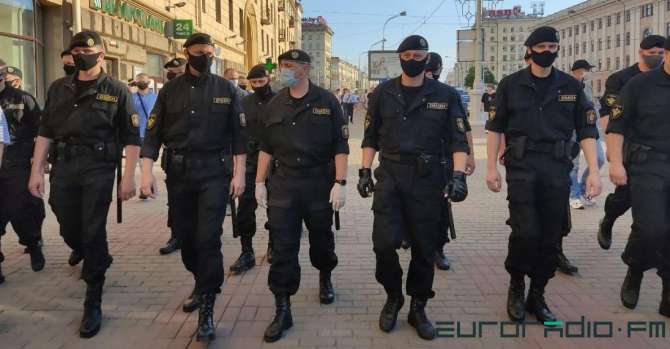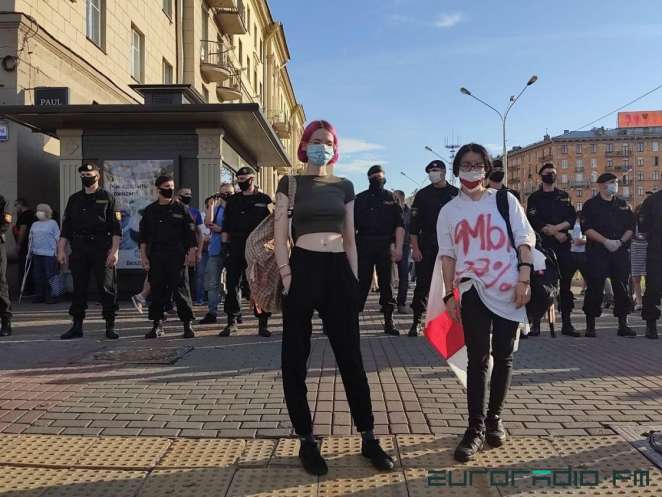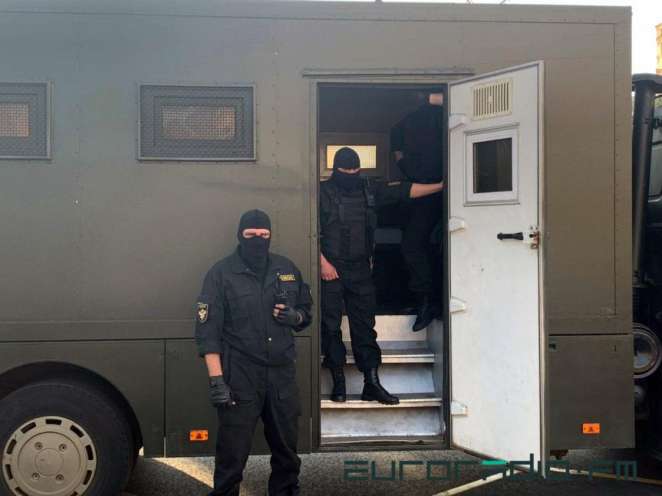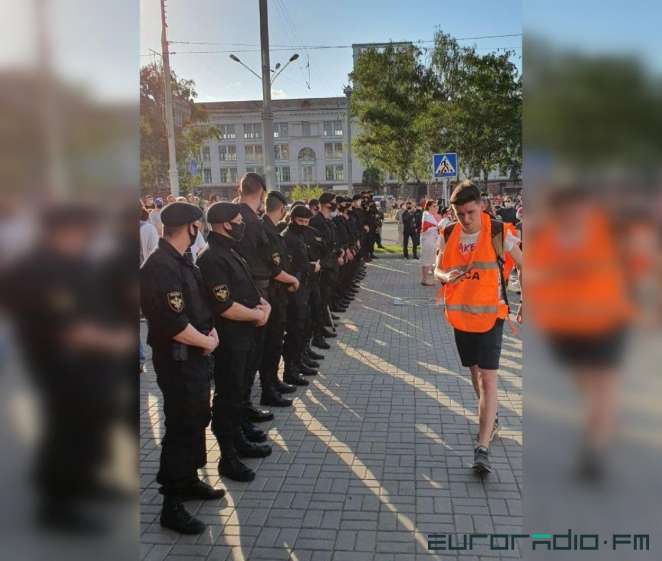We are transparent to them
ARTYOM MAYOROV, Euroradio
26 June 2020, 14:35
 I was literally thrown into a paddy wagon by two big musclemen. They had evil and empty eyes.
I was literally thrown into a paddy wagon by two big musclemen. They had evil and empty eyes.
"Get this fa**ot in here. You're in trouble now! What the f**k, what are you, press? I'm gonna put this press vest on your head," one of them said, welcoming me. "Why are you sitting here like that? It's no resort here. Things, phone -- take everything off, leave it here. And don't provoke me. Are you a trouble-maker or what?"
Why is this man acting like that? I told him I was not going to resist. Come on now, I understand orders are orders, but why so brutal? Or was it part of the order? I have expensive gear in my backpack, I'm very worried about it. But there's anger and emptiness in the muscleman's eyes. He doesn't care about that, it doesn't matter.
Together with my Euroradio workmate Maryia Vaytovich, we were streaming and taking pictures of the Solidarity Chain in Minsk. It was our editorial assignment. Even before the brutal arrests I took a few photos of the riot policemen. Only eyes can be seen behind the masks. Everyone had almost the same eyes, without reflections.
Remember our photo of riot policemen next to the open door of the paddy wagon? For a second, it even seemed that they were performing, showing fake anger. Almost like a wedding photographer, I gave them a thumb's up, thanking for the picture. The guys said, "Don't jerk off on them later." No, they were not acting. They really were angry.
When the riot police made a "box" to push the line of people away from Victory Square, I came almost too close to take photos of their faces. They looked as if my transparency was pushed to the max. Almost as if there were neither smartphone nor me behind it...
There were several journalists in the wagon -- a photographer from TUT.by, a correspondent from Ukraine, and my colleague Maryia. Also there was the guy who got thrown in with his bike. We were being watched by the same blank eyes. "Well, you stood there late last night, now you sit down, have a rest". Sometimes those conversations were interrupted by a "newcomer" thrown in.
They threw in a man who said he was on his way to visit a sick mother. He'd show us a soup jar later, but he'd still stay in the wagon. "I'll f*ck you up like it's nothing," the watchmen welcomed another detainee. The eyes stopped being empty and lit up for a second. Another officer stood up between them, trying to prevent a conflict.
Two young men said they got into the wagon from the bus stop: "We were going home, waiting for the bus 100. A policeman said 'to get the f*ck out of here'. We asked him for ID. And here we are now".
We were taken to the Leninski police department in a 'much cooler' paddy wagon. Inside it was divided into "cells" -- compartments the size of a small toilet. There were three or five people in each.
"Guys, aren't you ashamed?" No answer. "Guys, there's no air to breathe". No answer. "We can't breathe, we can't breathe". No answer.
At that moment, I really wanted to look into the eyes of those who were "on the other side," but it was impossible. A small peephole in the door was the only thing that led outside.
The police station greeted us like a "good cop" would: they took us to the reception room, copied our data, put things in bags, asked us to turn off the phones. Then they took us to the assembly hall, let us sit down as we please and drink water. The police officers took those who wanted to the toilet and called an ambulance for one of the detainees. In terms of intellectual quality, the level of rhetoric was absolutely the opposite. One of the policemen shook his head and quietly said: "It's a circus".
There were 50 people in the assembly hall, 6 of them were journalists. After the answer "Yes" to the question "So you were detained for doing your work?" we got a round of applause.
Then our data was copied, our journalist IDs were photographed, we were taken to the courtyard. The eyes of the Minsk police press secretary, who came down to us, looked nothing like the ones that had been looking at us in the wagon: "Come in, colleagues".
"We're just the body conducting the administrative process," explained the people in uniform. "Our task is to prove your guilt, we didn't bring you here, you can write a statement to prove the guilt of those who detained you, but there are no questions now, we have nothing to do with it".
![]() [/center]
[/center]
As a child, I was a shy guy, always afraid to look people in the eye. Looking into people's eyes could make me take my eyes away. To give up, to lose. It was like that at the principal's office. Or at the meeting with a strange-haired woman at the district executive office when I came to collect my admission papers.
As I got older, it gradually went away. And now, in 2020, there are no options any more -- we all started wearing masks. Even if you don't want to, you look in the window of one's soul.
On June 19, I decided to look people in the eyes, no matter how uncomfortable I felt. I succeeded. I kept my promise to myself. But I'm still not completely satisfied. Now I want to look into the eyes of the one who gives the orders.
Will I see in them the learned transparency too?
26 June 2020, 14:35

Riot police dispersing Solidarity Chain in Minsk / Euroradio.
"Get this fa**ot in here. You're in trouble now! What the f**k, what are you, press? I'm gonna put this press vest on your head," one of them said, welcoming me. "Why are you sitting here like that? It's no resort here. Things, phone -- take everything off, leave it here. And don't provoke me. Are you a trouble-maker or what?"
Why is this man acting like that? I told him I was not going to resist. Come on now, I understand orders are orders, but why so brutal? Or was it part of the order? I have expensive gear in my backpack, I'm very worried about it. But there's anger and emptiness in the muscleman's eyes. He doesn't care about that, it doesn't matter.
Together with my Euroradio workmate Maryia Vaytovich, we were streaming and taking pictures of the Solidarity Chain in Minsk. It was our editorial assignment. Even before the brutal arrests I took a few photos of the riot policemen. Only eyes can be seen behind the masks. Everyone had almost the same eyes, without reflections.
Learned transparency
Remember our photo of riot policemen next to the open door of the paddy wagon? For a second, it even seemed that they were performing, showing fake anger. Almost like a wedding photographer, I gave them a thumb's up, thanking for the picture. The guys said, "Don't jerk off on them later." No, they were not acting. They really were angry.
Riot policemen and their paddy wagon / Euroradio.
When the riot police made a "box" to push the line of people away from Victory Square, I came almost too close to take photos of their faces. They looked as if my transparency was pushed to the max. Almost as if there were neither smartphone nor me behind it...
There were several journalists in the wagon -- a photographer from TUT.by, a correspondent from Ukraine, and my colleague Maryia. Also there was the guy who got thrown in with his bike. We were being watched by the same blank eyes. "Well, you stood there late last night, now you sit down, have a rest". Sometimes those conversations were interrupted by a "newcomer" thrown in.
Artsyom Mayorau and riot police / source unknown
They threw in a man who said he was on his way to visit a sick mother. He'd show us a soup jar later, but he'd still stay in the wagon. "I'll f*ck you up like it's nothing," the watchmen welcomed another detainee. The eyes stopped being empty and lit up for a second. Another officer stood up between them, trying to prevent a conflict.
Two young men said they got into the wagon from the bus stop: "We were going home, waiting for the bus 100. A policeman said 'to get the f*ck out of here'. We asked him for ID. And here we are now".
"Good cop"
We were taken to the Leninski police department in a 'much cooler' paddy wagon. Inside it was divided into "cells" -- compartments the size of a small toilet. There were three or five people in each.
"Guys, aren't you ashamed?" No answer. "Guys, there's no air to breathe". No answer. "We can't breathe, we can't breathe". No answer.
At that moment, I really wanted to look into the eyes of those who were "on the other side," but it was impossible. A small peephole in the door was the only thing that led outside.
The police station greeted us like a "good cop" would: they took us to the reception room, copied our data, put things in bags, asked us to turn off the phones. Then they took us to the assembly hall, let us sit down as we please and drink water. The police officers took those who wanted to the toilet and called an ambulance for one of the detainees. In terms of intellectual quality, the level of rhetoric was absolutely the opposite. One of the policemen shook his head and quietly said: "It's a circus".
There were 50 people in the assembly hall, 6 of them were journalists. After the answer "Yes" to the question "So you were detained for doing your work?" we got a round of applause.
Then our data was copied, our journalist IDs were photographed, we were taken to the courtyard. The eyes of the Minsk police press secretary, who came down to us, looked nothing like the ones that had been looking at us in the wagon: "Come in, colleagues".
"We're just the body conducting the administrative process," explained the people in uniform. "Our task is to prove your guilt, we didn't bring you here, you can write a statement to prove the guilt of those who detained you, but there are no questions now, we have nothing to do with it".
 [/center]
[/center]June 19, a protest rally in Minsk / Euroradio.
Look straight in the eye
As a child, I was a shy guy, always afraid to look people in the eye. Looking into people's eyes could make me take my eyes away. To give up, to lose. It was like that at the principal's office. Or at the meeting with a strange-haired woman at the district executive office when I came to collect my admission papers.
As I got older, it gradually went away. And now, in 2020, there are no options any more -- we all started wearing masks. Even if you don't want to, you look in the window of one's soul.
On June 19, I decided to look people in the eyes, no matter how uncomfortable I felt. I succeeded. I kept my promise to myself. But I'm still not completely satisfied. Now I want to look into the eyes of the one who gives the orders.
Will I see in them the learned transparency too?



